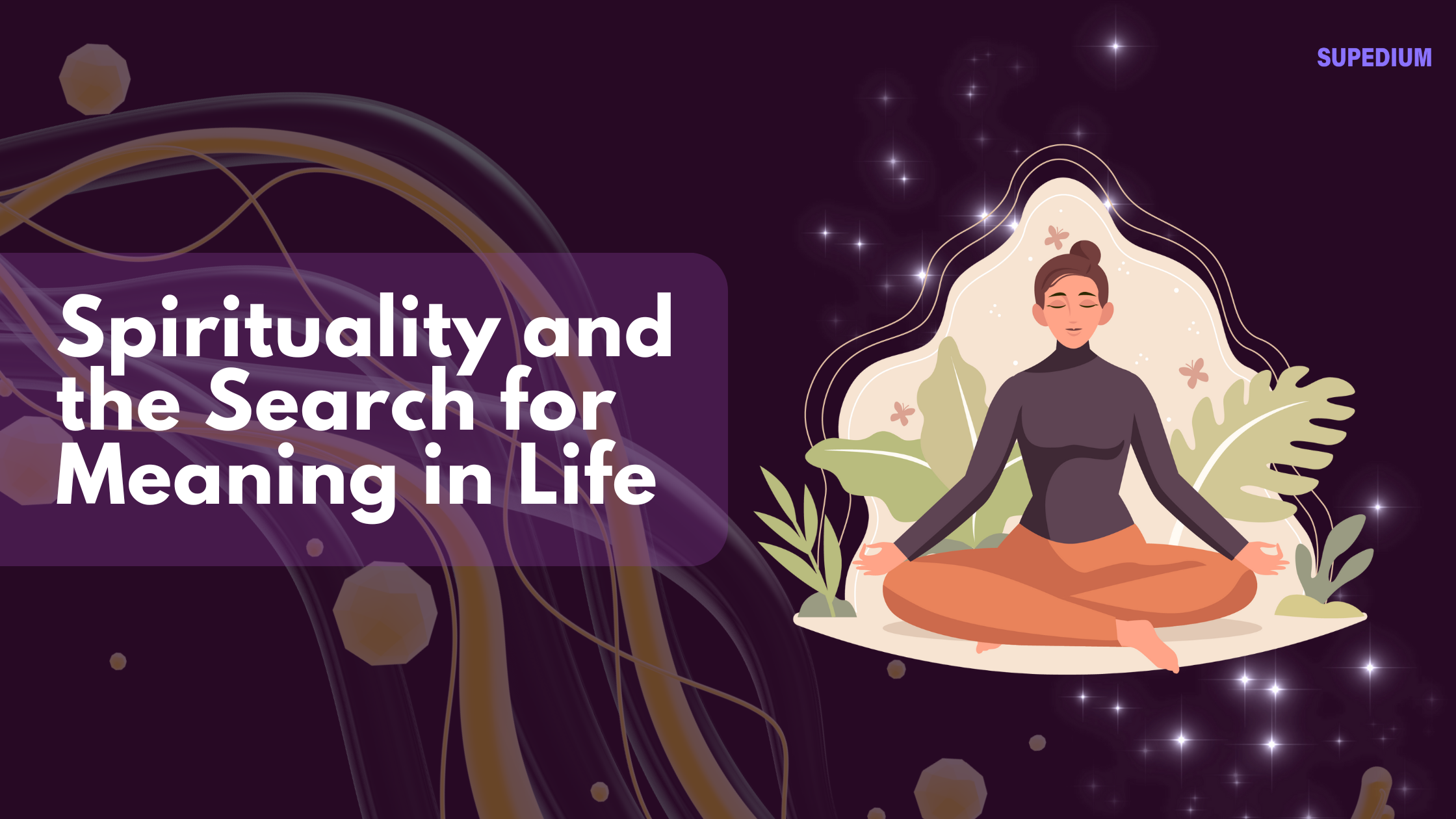Table of Contents
![]()
Introduction
Definition of Spirituality
Spirituality is a multifaceted concept that varies widely across cultures and individual experiences. At its core, it often involves a sense of connection to something greater than oneself, whether that be a higher power, the universe, or the collective human experience. Unlike religion, which is typically organized around specific doctrines and practices, spirituality can be more personal and fluid, allowing individuals to explore and define their own sense of purpose and meaning.
Importance of the Search for Meaning
The quest for meaning is a fundamental aspect of the human condition. From a psychological perspective, finding meaning in life is linked to greater well-being and happiness. Philosophers like Viktor Frankl have argued that the search for meaning is a primary driver of human behavior, and understanding one’s purpose can profoundly impact mental health and overall life satisfaction.
Purpose of the Discussion
This article explores how spirituality contributes to the search for meaning in life. It examines historical perspectives, the role of spirituality in personal growth, and the various paths individuals might take in their quest for meaning. By understanding these aspects, we gain insight into how spirituality can influence and enrich our lives.
Historical Perspectives on Spirituality
Ancient Views
In ancient civilizations, spirituality was deeply intertwined with early religious practices and philosophical thought. For instance, Hinduism and Buddhism offered frameworks for understanding existence through concepts like karma and enlightenment. Ancient Greek philosophers, such as Socrates and Plato, explored the nature of the soul and the pursuit of truth, contributing to the broader understanding of spirituality and its relation to human meaning.
Medieval and Renaissance Perspectives
During the medieval period, spirituality continued to evolve, blending with emerging scientific and philosophical ideas. Major religious figures, including St. Augustine and Thomas Aquinas, sought to reconcile faith with reason. Sufism, a mystical branch of Islam, and the Christian mystics emphasized personal spiritual experiences and the quest for divine union, reflecting a nuanced understanding of spirituality’s role in human life.
Modern and Contemporary Views
In the modern era, spirituality has been influenced by secularism and scientific advancements. The rise of existentialism, championed by figures like Jean-Paul Sartre and Albert Camus, focused on the individual’s struggle to find meaning in a seemingly indifferent universe. Carl Jung’s exploration of the collective unconscious and Viktor Frankl’s existential analysis highlighted how spirituality and the search for meaning intersect with psychological and philosophical inquiry.
The Role of Spirituality in the Search for Meaning
Personal Growth and Self-Discovery
Spirituality often plays a crucial role in personal growth and self-discovery. Practices such as meditation, prayer, and contemplation can lead to profound insights and transformations. Many people report that spiritual experiences have helped them understand their true selves, uncover their purpose, and navigate life’s challenges with greater clarity and resilience.
Connection and Community
Another significant aspect of spirituality is its ability to foster connection and build communities. Shared spiritual practices and beliefs can create strong bonds among individuals, providing a sense of belonging and support. Spiritual communities, whether religious or secular, offer spaces where people can explore their values and purpose together, reinforcing their sense of meaning.
Coping with Adversity
Spirituality can be a source of strength during difficult times. Many individuals turn to spiritual practices to cope with adversity, finding comfort and resilience through their beliefs. Stories of spiritual resilience, such as those seen in various religious and philosophical traditions, illustrate how spirituality can provide solace and a sense of hope during challenging periods.
Different Paths to Spirituality
Religious Traditions
Major world religions each offer unique perspectives on spirituality and the search for meaning. Christianity, Islam, Judaism, Buddhism, and Hinduism all provide frameworks for understanding human existence and purpose. For instance, Christianity emphasizes salvation and eternal life, while Buddhism focuses on the path to enlightenment and liberation from suffering. Each tradition offers its adherents various practices and teachings designed to help them find meaning and purpose in life.
Secular and Non-Religious Spirituality
In addition to traditional religions, secular and non-religious forms of spirituality have gained prominence. New Age practices, such as holistic healing and personal empowerment, reflect a more eclectic approach to spirituality. Philosophical perspectives like Humanism and Stoicism offer frameworks for finding meaning without relying on religious beliefs, emphasizing personal responsibility and ethical living.
Personal and Eclectic Approaches
Many individuals create their own spiritual paths by combining elements from various traditions and practices. This eclectic approach allows people to tailor their spirituality to fit their personal beliefs and experiences. Mindfulness and meditation, for example, are widely practiced across different spiritual contexts and have been integrated into secular lifestyles as well, offering tools for self-improvement and meaning-making.
Spirituality and Psychological Well-being
Mental Health Benefits
Research has shown that spirituality can have positive effects on mental health. Spiritual practices are often associated with lower levels of stress, anxiety, and depression. Engaging in spiritual activities can provide individuals with a sense of purpose and belonging, contributing to overall psychological well-being.
Existential Fulfillment
Spirituality often addresses existential concerns by providing a framework for understanding life’s purpose. By engaging in spiritual practices and exploring personal beliefs, individuals can find greater fulfillment and navigate existential crises more effectively. Spirituality offers tools for grappling with questions about existence and meaning, helping individuals make sense of their lives.
Ethical and Moral Dimensions
Spirituality can also influence ethical and moral decision-making. Many spiritual traditions emphasize values such as compassion, empathy, and integrity, which guide adherents in their interactions with others. Spiritual beliefs can shape one’s ethical framework, promoting actions that align with a deeper sense of purpose and connection to the broader human experience.
Criticisms and Challenges
Skepticism and Critique
Despite its benefits, spirituality is not without its critics. Some argue that spiritual experiences lack scientific validity or are merely psychological phenomena. Debates about the nature and legitimacy of spiritual experiences continue, challenging the broader acceptance of spirituality as a means of finding meaning.
Potential Pitfalls
Spirituality can also have potential pitfalls. Spiritual bypassing, where individuals use spiritual practices to avoid addressing personal issues, is a concern. Additionally, the commercialization of spirituality can lead to exploitation and dilute the authentic pursuit of meaning. It’s important for individuals to approach spirituality thoughtfully and avoid falling into these traps.
Balancing Spirituality and Practical Life
Integrating spirituality into everyday life can be challenging. Balancing spiritual practices with practical responsibilities requires thoughtful planning and commitment. Navigating conflicts between spiritual beliefs and societal norms can also present difficulties. However, finding a balance between spiritual pursuits and practical concerns is crucial for maintaining a meaningful and fulfilling life.
Conclusion
Summary of Key Points
Spirituality plays a significant role in the search for meaning, offering diverse paths for personal growth, connection, and coping with adversity. From historical perspectives to modern practices, spirituality provides a framework for understanding existence and finding purpose. Whether through religious traditions, secular approaches, or personal exploration, spirituality enriches our lives and contributes to our overall well-being.
Personal Reflection
Encouraging individual exploration and reflection is essential for finding personal meaning. Each person’s journey is unique, and engaging with spirituality can provide valuable insights and fulfillment. Taking the time to reflect on one’s beliefs and experiences can lead to a deeper understanding of oneself and one’s place in the world.
Future Directions
As spirituality continues to evolve, new trends and research will likely shape our understanding of its role in the search for meaning. Emerging perspectives and ongoing philosophical inquiry will contribute to a richer and more nuanced exploration of spirituality and its impact on human life.
Share This





Be the first to comment